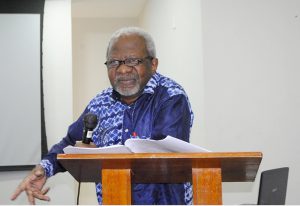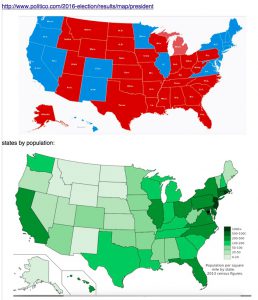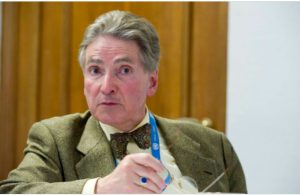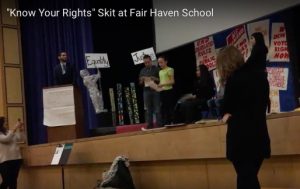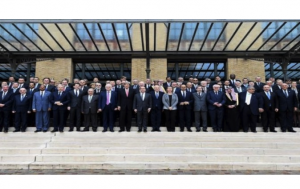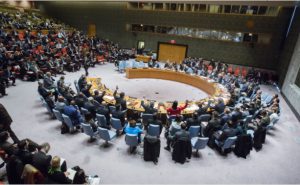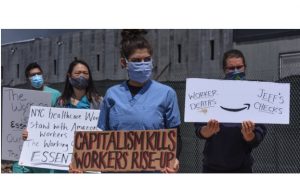FREE FLOW OF INFORMATION
Extracts from the website to Support Antoine Deltour
LuxLeaks is the disclosure of hundreds of tax agreements between Luxembourg authorities and multinational companies, bringing to light a large-scale tax avoidance planning. LuxLeaks is also the name of the investigation conducted by the l’International Consortium of Investigative Journalism (ICIJ) on the disclosed documents.
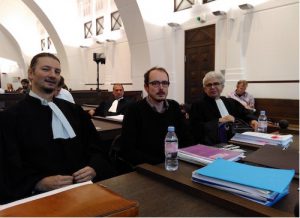
Me Philippe Penning, Antoine Deltour, and Me William Bourdon © Comité de soutien à Antoine Deltour – CC BY-SA 4.0
Click on the image to enlarge
LuxLeaks “dropped the bomb” and provoked many indignant reactions all over the world. By bringing the tax rulings issue to the worldwide governing authorities –notably the G20 Brisbane Summit and the European Commission– it fostered democratic discussions that will progressively lead to reinforce fiscal justice.
Antoine Deltour, [along with Raphaël Halet] is one of the whistleblowers behind the disclosure of many of the LuxLeaks documents. Today Antoine is on trial in Luxembourg. He needs your support!
Read more on Wikipedia.
LuxLeaks Appeal trial: Fifth and last hearing
The LuxLeaks appeal trial ended on January 9th. On the agenda of the day: the replies from all sides to prosecutor indictment and to the defendants’ lawyers’ pleadings.
Some forty supporters came from France and a few others from Germany, Belgium, and Luxembourg.
Prosecutor’s reply
Prosecutor Mr. John Petry begins his reply by recognising Antoine Deltour and Raphaël Halet as whistleblowers: according to him, “the public interest is not subject to interpretation”. However, apprently trying by all manner of means to justify the conviction of Antoine, he considers that they “can’t benefit from full protection” because they do not meet all the criteria established by the European Court of Human Rights’s jurisprudence. Petry particularly blames Antoine for not being “animated with the intention of a whistleblower” at the time he copied the documents.
Considering the prejudice caused, the prosecutor asserts that “the end doesn’t justify the means”: the “LuxLeaks operation” would have “named and shamed the professionals and clients” and would therefore be considered disproportionate in the light of its public interest.
Only the massive and public feature of the revelations seems to cause problem to John Petry, who even asserts that “if the documents had been used only for the ‘Cash Investigation’ broadcast, acquittal could be a serious option”.
Concerning Raphael Halet, Prosecutor Petry simply considers that the documents he copied would be “irrelevant”, and that their disclosure was “not a necessity”. The acquittal would therefore not be justified.
Finally, in the case of the journalist Édouard Perrin, Prosecutor Petry says he is “very embarrassed” by an appeal that he does not consider “justified”. He recognizes that “the indictment of a journalist in a democratic society should be an exception”, he asks –unsurpringly– for the acquittal of Édouard Perrin.
Plaintiff’s reply [Editor’s note: The plaintiff, PwC, is PricewaterhouseCoopers, the second largest professional services firm and one of the four largest accounting firms in the world.)
Mr. Hansen, plaintiff PwC’s lawyer, maintains his position: “The defense wants to make us believe that an individual conception of morality can be a justification for violating the law”. Then he tries to challenge Antoine’s defense in relation to the European Court of Human Rights’s jurisprudence and reaffirms that Antoine had “no whistleblowing intention at the time he robbed the documents”. Furthermore, Hansen believes that Antoine “gave no consideration to the interests of his employer”. Hansen considers that the damage caused to his client represents “several thousand hours of work lost”, and that, if PwC’s turnover has increased, it is “in spite of the theft of documents, not because of theft”.
Considering Raphaël Halet case, the plaintiff’s lawyer reproaches Halet –as the prosecutor– of having “brought nothing to the public debate”.
In concluding, Hansen gave a rather vindictive reply. He called on the Court of Appeal to uphold the civil judgment and to recognize PwC as a “victim”.
(Article continued in the right column.)
(Click here for the French version of this article.)
Question(s) related to this article:
Free flow of information, How is it important for a culture of peace?
The courage of Mordecai Vanunu and other whistle-blowers, How can we emulate it in our lives?
(Article continued from left column)
Reply of Antoine Deltour’s lawyers
Mr. Philippe Penning, Antoine’s Luxemburgish lawyer, begins by recalling the almost daily progress on tax transparency, which are “the consequences of the LuxLeaks affair”. He then asks, bewildered: “Deltour’s hesitation and the efficiency of the LuxLeaks revelations would lead him to his loss? There is a serious problem!”. The Luxemburgish lawyer also calls on his compatriots to avoid any “self-protection reflex”; He asserts that “Luxembourg survived the war and the oil shock and will survive the end of mass tax rulings”. The audience applauds.
Mr. William Bourdon then takes the floor. He welcomes the fact that the appeal process has brought “better legal questions than at the first instance” and denounces an “intellectual kidnapping” used as a last resort to “take the judicial scalp of Antoine Deltour”. He strongly contests the need to add a “criterion of determination” to justify whistleblower’s good faith, even considering that such jurisprudence would have “damaging, terrible, irrational, perverse, and toxic consequences!”. He recalled that several months before the documents were copied, Antoine already proved his intention by signing a blog comment with the signature “Insider, maybe future whistleblower”.
Mr. Bourdon denounces the plaintiff that has difficulty in justifying itself, he ironizes on the so-called prejudice by questioning: “What is this mute assembly of hurt clients? Not even one document can prove a prejudice!”.
Mr. Bourdon concludes by stating that “in order to be consistent with the European Court of Human Rights’s jurisprudence, the Court must acquit Antoine Deltour”. New round of applause.
Reply of Raphaël Halet’s lawyers
After a short break, the hearing resumes with the reply of Mr. Bernard Colin, for the defense of Raphaël Halet. Colin comes back widely on his denunciation of the illegality of tax rulings’ practice in Luxembourg before 2014. Returning in detail to the “legislative loophole” governing Marius Kohl’s work at the famous Bureau #6, Mr Colin believes that, “by giving the keys to PwC”, the rule of law has been flouted. He calls for the acquittal of his client.
Ms. May Nalepa, second lawyer of Raphael Halet, emphasizes the irony of the reproaches made to Deltour on the massive nature of his revelations, and on the opposite, the reproaches made to Halet on the lack of substance of his leaks: “the next whistleblower will have to be a real tightrope walker to find out the right balance!”.
Reply of Édouard Perrin’s lawyers
Unsurprisingly, Édouard Perrin’s lawyers greet the prosecutor who said he was “embarrassed” by the appeal on their client. Ms. Christel Hénon and Mr. Olivier Chappuis affirm that it would even be “unthinkable” that Perrin be convicted of common law offenses. They naturally call “a last time” for the journalist’s acquittal.
The final words to the defendants
Antoine Deltour speaks first. He begins with confirming his declaration done during the first instance: “I followed a citizen’s approach”. Antoine recognizes that he “did not anticipate the repercussions of the LuxLeaks affair” –no one could– but he insists that he had “obviously intended to draw attention to these practices”. Fearing for his employability or possible legal consequences, Antoine says he could “not act hastily”. As to the proportionality of the damage caused, he recalls that the options for disclosure devised by the prosecution would doubtlessly not have resulted in such a clear public interest.
Antoine then concludes: “I wouldn’t understand a condemnation for having acted as a citizen concerned about the general European interest”. Sustained applause in the room.
Raphaël Halet then speaks up, very incisive: “This trial should be that of tax evasion and the people who covered it!”. Halet insists on Marius Kohl’s administration as a “black hole”. He finally concludes: “Condemning the messenger has never brought victory to a war. On the contrary, it should be the war against tax evasion!”.
Édouard Perrin finally speaks briefly, humbly presenting his apologies to Halet and Deltour “for having brought them in this judicial adventure”. The journalist wishes to thank the two whistleblowers, who have “acted in the general interest”.
Verdict on March 15th
Today’s very dense hearing ends the appeal LuxLeaks trial. Mr. Michel Reiffers, President of the Appeal Court, announces that he defers decision of the verdict. The judgment will be delivered on March 15th, 2017.
Let’s hope for the acquittal of the three defendants!

